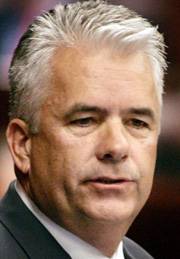
SOLAR GRID: A field of solar panels stretches across El Dorado Valley outside Boulder City at Sempra Energy, the largest thin-film solar-power facility in North America.
Friday, Dec. 10, 2010 | 2 a.m.
SOLAR BREAK
The program included in the latest compromise President Barack Obama is working on is in danger of expiring. It was inaugurated under the president’s stimulus package in 2009 and allows companies to turn research and development tax cuts into hard cash.

Harry Reid

John Ensign
Sun archives
- Mayor: New power-producing solar carports 'big deal' for Las Vegas (12-9-2010)
- Nellis wants to double the base’s solar energy output (11-23-2010)
- Solar research facility planned for Nevada Test Site (7-8-2010)
- State reveals plan to step up solar energy development (6-4-10)
- Green energy, military seek common ground (1-8-2010)
- NV Energy agrees to purchase Crescent Dunes solar power (12-22-2009)
- The cost of building a solar powered economy (8-16-2009)
- Interior bets big on Western solar energy (7-3-2009)
- Obama, Reid tour Nellis solar facility (5-27-2009)
- Solar developers shoot to beat buzzer for cash (3-22-2009)
Sun Coverage
Largely lost amid the debate over extending the Bush-era tax cuts was that President Barack Obama’s framework for extending them could have dealt a severe, if not fatal, blow to Nevada’s renewable energy industry.
After a revolt by House Democrats, an outcry from their counterparts in the Senate and principled opposition from Republican factions, Obama’s compromise was being reworked, with lawmakers agreeing Thursday to insert an extension of tax credits used to fund solar and wind energy projects in the bill still under construction.
The program, which is in danger of expiring, was inaugurated under the president’s stimulus package in 2009. It allows companies to turn research and development tax cuts into cash — a necessary step to finance an industry in its infancy in bad economic times.
“It’s been a way to make up for the fact that most of the organizations that used to provide tax equity no longer are,” said Ian Rogoff, executive chairman of HelioPower, a company that develops commercial solar projects in the Reno-Carson City area, Southern Nevada and California. “What the grants enabled the industry to do is continue.”
Despite high praise for the credits-to-grants program from renewable energy states, Democrats in Congress and Energy Secretary Steven Chu, an extension wasn’t included in the initial version of the tax framework.
That sent several lawmakers, especially those from Western states, scurrying to include an extension in the bill.
“It is proven to create jobs,” Democratic Sen. Dianne Feinstein of California wrote in an op-ed in Politico pushing for its inclusion in the tax bill. “If Congress allows taxes to increase on renewable development, momentum could be lost. The future of renewable energy may be jeopardized.”
Feinstein had been pushing for a two-year extension, but the bill as it stands contains a one-year extension.
Although that’s welcome news, it’s not likely to be enough to get the renewable energy industry across the finish line. Recent studies have shown that the industry, left to its own devices and current market forces, isn’t altogether viable.
The culprit is a mix of global market pressures and timing. Renewable energy projects, although improving in efficiency — the cost of solar panel production is 50 percent lower than it was a few years ago — aren’t producing enough revenue to be self-sustaining. And the recession’s radiating shocks in foreign markets have left the United States with a stronger dollar against other currencies, making the cost of importing fossil fuel relatively cheap.
Cutting a program such as the extension could jeopardize development of the industry and the proliferation of solar panels across Nevada.
In addition to his work at HelioPower, Rogoff was a co-founder of the Sierra Nevada solar company. Both have been direct and indirect recipients of the credits-to-grants program.
Before the recession, the Rogoff's companies used to get the bulk of their tax credit equity financing from Citibank, Rogoff said. But as the markets dried up, and Citibank, which used to hold about 10 percent of total bank capital in the United States, had to turn to the government for a bailout, the funding disappeared.
“We were kind of at the mercy of big banks ... most companies in renewable energy are nowhere near as big or profitable. They’re not mature enough to absorb (tax) credits into their earnings,” Rogoff said.
So in the short term, no grants mean no solar panels for many independent business owners hoping to green their energy supply — you don’t have to be just an energy research facility to apply, just be funding a relevant project.
Although Nevada’s senators say the inclusion of the extension will be a good thing for the state, they’re not guaranteeing they’ll support the bill, for other reasons.
For Reid, the bill’s been tough to swallow because it goes against a core tenet that he’s espoused for months: Those earning more than $250,000 don’t need a tax cut.
For Republican Sen. John Ensign, there’s an equally existential argument to be made against the legislation. “While I don’t believe that anyone should have their taxes raised ... we should have at least worked on putting a package of spending cuts together to offset this bill,” he said Thursday. “It’s good for the economy in the short term, but the debt is going to kill us in the not-too-long term.”
Ensign said he is working with Republican Oklahoma Sen. Tom Coburn and others on amendments to the tax bill that would propose spending offsets. However, it’s not clear whether amendments will be allowed on the bill.
If there are, stay tuned — there could be more bounty in store for Nevada.
Reid appears to have re-energized a push to include a legalization of online poker in some sort of legislative vehicle before the lame-duck session draws to a close. The chances don’t look all that good, but informal discussions appeared to be continuing among Reid, Ensign, Minority Leader Mitch McConnell of Kentucky and Minority Whip Jon Kyl of Arizona, who said this week that there was “zero chance” the tax bill would feature any sort of online poker language.
For now, he’s right. In the first version of the tax bill Reid released Thursday night, it didn’t.

Join the Discussion:
Check this out for a full explanation of our conversion to the LiveFyre commenting system and instructions on how to sign up for an account.
Full comments policy